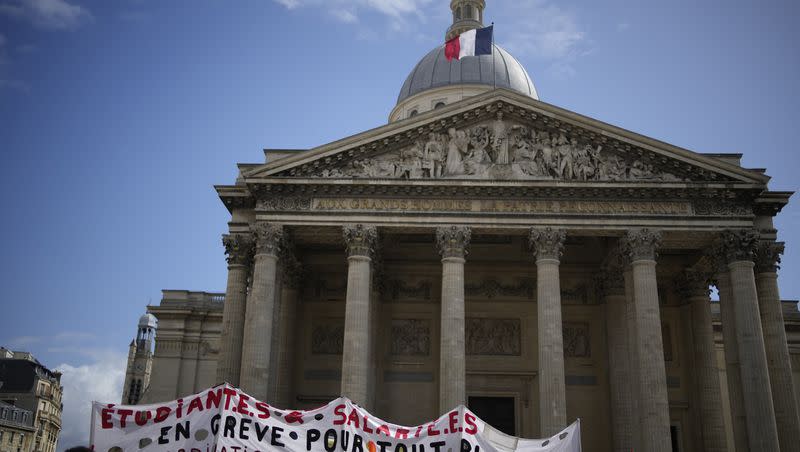Opinion: France has a history with instability. Are current protests threatening a return to that past?

- Oops!Something went wrong.Please try again later.
- Oops!Something went wrong.Please try again later.
President Emmanuel Macron and the people of France are facing a significant challenge to government authority, social stability and the future of the nation. Massive sustained protest demonstrations have turned into violent clashes between enraged workers and the police. The unrest is continuing.
The source of the ongoing unrest is the effort by Macron to increase the retirement age in the nation. The change raises the retirement age from 62 to 64 and also requires people to work for 43 years to qualify for a full pension.
Macron decided to make these significant shifts through executive order rather than a vote in parliament. The constitution of the Fifth Republic, instituted by President Charles de Gaulle, provides considerable power to the chief executive.
Protestors have set fire to uncollected garbage in Paris. There has been sporadic fighting with police. Separate from the pension protests, protestors near the village of Sainte-Soline in western France have clashed with police over a projected water reservoir, which is opposed by environmentalists.
The massive displays of public hostility are particularly important given the important role of France in the European Union, and the continuing war in Ukraine. Britain has postponed a planned visit by King Charles III to France.
Related
The Louvre closes as France prepares for hundred of thousands of protesters
Opinion: Garbage is piling up in Paris. Is this our future if we don’t fix Social Security?
These dramatic developments are occurring only 11 months after Macron’s impressive reelection to office. Last April, he received just over 58% of the vote, against just under 42% for opponent Marine Le Pen. This margin, while decisive, is narrower than in 2017 when these same two candidates competed for the presidency.
Most important is that the presidential election seemed to reconfirm the stability of France’s domestic political structures and institutions of government. This is no small matter.
Instability previously characterized France.
The decisive, stunning military defeat of the large, well-armed but woefully weak army of France in the spring of 1940 by the fast-moving blitzkrieg of Nazi Germany began four years of brutal, humiliating occupation. Years of weak, ineffective governments followed Allied liberation of France in 1944.
De Gaulle, exceptional leader of the Free French during the war, returned as leader of France in 1958. He succeeded in stabilizing the nation’s politics, and finally reestablished effective national authority and legitimacy.
De Gaulle’s constitution creates a powerful presidency, key to long-term stability. A referendum in 1962 confirmed direct election of the president through universal suffrage. In 2000, a referendum reduced the presidential term from seven to five years.
In this century, the alliance with the U.S. has been strong. Immediately after the terrorist attacks of 9/11, French aircraft joined those of other NATO allies in patrolling the skies over North America. The struggle against al Qaeda and the Taliban represents a comprehensive collective enterprise, authorized and supported by the United Nations as well as the NATO alliance.
Related
De Gaulle was in power during President Dwight Eisenhower’s second term. Ike developed good working rapport with the difficult French leader during World War II. While planning the Normandy invasion, some American and British air commanders argued against heavy bombing, which would kill many civilians.
Eisenhower was able to turn to de Gaulle to support the heavy bombing.
The Kennedy and Johnson administrations clashed with de Gaulle’s nationalist policies. In 1966, France withdrew from NATO. Fortunately, in 2009 the nation rejoined the alliance.
Current unrest in France has significant international implications.
Learn More: Stanley Hoffmann (Editor), “In Search of France.”
Arthur I. Cyr is author of “After the Cold War – American Foreign Policy, Europe and Asia.” Contact acyr@carthage.edu
